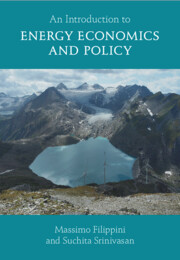Book contents
- Frontmatter
- Contents
- Figures
- Tables
- Preface
- Acknowledgements
- 1 Energy Economics and Current Energy Systems
- 2 Market Failures and Behavioural Anomalies
- 3 Energy Demand–Theory and Empirical Analysis
- 4 Economic Analysis of Energy Investments
- 5 Economics of Energy Efficiency
- 6 Energy-related Market Forms
- 7 Market-based Economic Instruments
- 8 Non-market-based Instruments
- 9 Policy Choice and Evaluation
- Special Terms
- References
- Index
7 - Market-based Economic Instruments
Published online by Cambridge University Press: 19 December 2024
- Frontmatter
- Contents
- Figures
- Tables
- Preface
- Acknowledgements
- 1 Energy Economics and Current Energy Systems
- 2 Market Failures and Behavioural Anomalies
- 3 Energy Demand–Theory and Empirical Analysis
- 4 Economic Analysis of Energy Investments
- 5 Economics of Energy Efficiency
- 6 Energy-related Market Forms
- 7 Market-based Economic Instruments
- 8 Non-market-based Instruments
- 9 Policy Choice and Evaluation
- Special Terms
- References
- Index
Summary
In this chapter, we first provide a general overview of energy and climate policy goals and their main instruments. We underline the common goals between energy and climate policy, as well as possible conflicts in objectives. In the next part, we illustrate monetary market-based instruments such as pollution taxes, product taxes, and energy taxes, as well as subsidies and pollution permit trading systems. We also discuss, using figures, the implications of behavioural anomalies on the effectiveness of these types of policy instruments. At the end of the chapter, we introduce non-monetary market-based instruments, giving some weight to nudges. At the end of the chapter, we discuss issues in developing countries related to the topics discussed in the chapter.
Keywords
- Type
- Chapter
- Information
- An Introduction to Energy Economics and Policy , pp. 162 - 202Publisher: Cambridge University PressPrint publication year: 2024
- Creative Commons
- This content is Open Access and distributed under the terms of the Creative Commons Attribution licence CC-BY-NC-ND 4.0 https://creativecommons.org/cclicenses/

